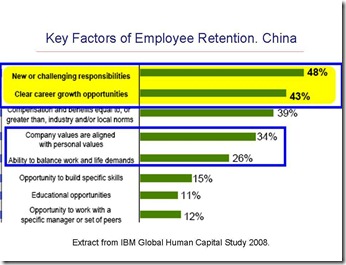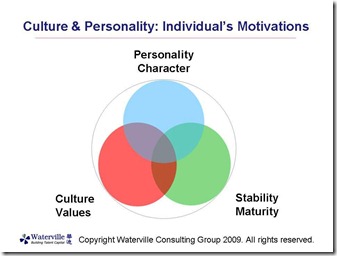An interesting piece of article by Jean Christophe Florenson.
Somewhere between the outdated concept that “Chinese employees want to work for foreign manager to learn Western methods” and recent articles announcing “The end of Western management methods in China” the expectations and characterizations of Chinese nationals are shifting. Also, personal values and motivations are becoming leading factors in the way Chinese people make career decisions. By failing to understand the values and motivations of their Chinese employees, foreign executives risk leaving out a fundamental component of the talent development equation.
Many international managers have noticed that “opportunity to learn and grow” always ranks as top priority in employee retention surveys. They have also heard a lot about cultural differences and therefore push for heavy employee development programs including a cross-cultural module. Yet, these programs seldom convert into higher staff engagement or loyalty.
When it comes to developing and retaining talent in China, foreign executives often face 3 main challenges:
- First, gaining a sound understanding of the traditional Chinese culture and its impact on the way to do business and manage people. In her very popular article, Mona Chung (1) mentioned for example the concept of Guanxi’ 关系 (relationship) as one of first cultural concept foreign executives must become familiar with. In terms of talent development and retention, compared to Western, Chinese employees tend to be less loyal to the organization as an abstract entity and more attached to their connection with their manager at a personal level.
- Second, revisiting their initial conclusion and fine-tuning. In China, more than anywhere else, “All I know it that I know nothing”: The country is diverse and its culture is an ever-green concept. When they start segmenting Chinese people into different age categories or geographic zones for instance, foreign executives enter a new stage of understanding the subtleties of Chinese culture, its diversity and its evolving aspect.
- Third, distinguishing the culture influence from the individual’s own characteristics and expectations. This is that particular accurate cross-cultural understanding of their Chinese employees’ values and motivations that enables foreign managers to more effectively lead their people, projects and organizations.
The road to hell is paved with good intentions!
Foreign executives assigned to China are often successful business people with impressive track records who arrive in this new marketplace with a strong intention of “getting things done” and think in terms of “best practices”. When it comes to managing Chinese talent, many international leaders let themselves become misguided by some old stereotypes such as ”local employees feel they can learn more from a foreign manager, especially about Western methods of doing business,” and therefore behave like evangelists on a mission to convert Chinese people to Western business practices.
However, opposite theory has emerged in recent months and some articles in the Chinese press have even announced "the end of Western management methods in China.” Many factors have contributed to this “anti-western” sentiment. I personally find it very interesting to observe how the Chinese government has leveraged events such as the Sichuan earthquake, the 2008 Beijing Olympics and the financial crisis to fuel a growing sense of national pride. Whatever the reasons, emotional or rational, many Chinese employees have lost interest in making efforts to implement Western management principles and are looking instead towards their own traditional culture for guidance. For instance, in a recent article, Franck Gallo (2) briefly described how some Chinese see the current world economic crisis as the result of Western investment bankers taking risks that they should not have. This attitude shift in the Chinese is a possible source of new tension between risk-seeking international managers and their Chinese employees.
This wave of national pride and anti-western sentiment will probably gain momentum with future events such as the 2010 Shanghai World Exposition, but overall I believe that this let's-go-back-to-the-past movement won't last: I have no doubt that in the long-term China will continue its journey towards modernity. It is therefore imperative for foreign managers working in China to pay attention to shifts in the social environment and specifically understand the needs and expectations of the local employees on an individual basis. There is no one-size fits all methodology of how to best manage an entire nation of professional talent.
After all, you are not managing Chinese representative of the national culture, but individuals driven by their own personalities
When it comes to effectively developing people in China, many managers find it a daunting task to separate national culture and individual personality. After all, managing people, in any cultural context, has less to do with handling representatives of the country and its culture than it has to do with inspiring individuals who have distinctive values and personalities. By failing to understand the values and motivations of their Chinese employees, foreign executives risk leaving out a fundamental component of the talent development equation. This concept is applicable all over the world, but especially so in China!
How does one solve problems? Make decisions? Build trust and communicate with others? Those questions are not easy to address, because they are moving targets. We can adapt our behavior and adjust our attitude; however, what does not change is the individual personality. An individual’s personality drives his or her unique ways of responding to internal and external signals. For instance, does he or she have the empathy needed to understand client needs? The resilience required to bounce back from rejection? The thoroughness needed to execute the plan? Those are the important nuances that can make all the difference as to whether an individual will be happy and successful in his or her job.
Let’s go back to our example of how you can improve risk-taking behavior in your organization. What if, instead of starting with a set program of how the organization will approach risk-taking behavior, we focus instead on the individual employee’s personality traits that guide his or her responses towards taking risks? By understanding how one is comfortable when evaluating various options, thriving under pressure, handling rejection, etc,. we can leverage the individual’s unique set of strengths to facilitate risk taking behavior and drive innovation.
Think with an open mind and act with a compassionate heart
In short, I would always recommend to both foreign and Chinese managers to not try to define big cultural issues and rather focus on better understanding their employees’ values and motivations, especially in China where employees want to see that their manager is interested in them as people, as opposed to workers, and treats them in a caring and friendly manner.
(1)Mona Chung, “The impact of culture difference when entering the Chinese market” April 8th, 2008 by China Business Success Stories
(2)Franck Gallo, “Risk-Taking Among Chinese Employees” June 10th, 2009 by China Business Success Stories
---
Jean-Christophe Florenson is the Director of Business Development at Waterville (www.watervilleinc.com), a high-end HR consultancy, headquartered in Shanghai, leader in success potential analysis and talent capital enhancement. JC also coordinates the publication of brief case studies on www.ManagingPeopleInChina.com, offering practical solutions based on actual experience shared with China-based executives and consultants.





 Share on Tianji.com
Share on Tianji.com